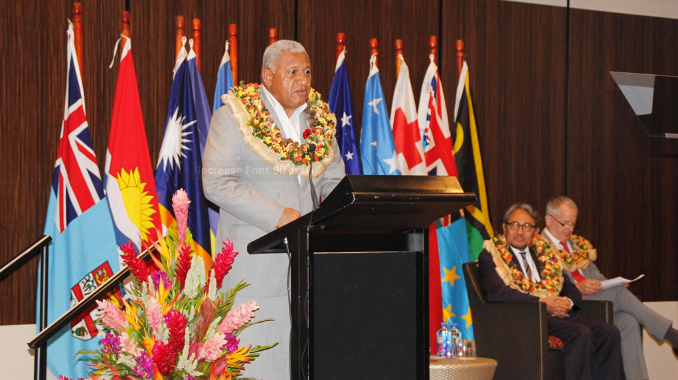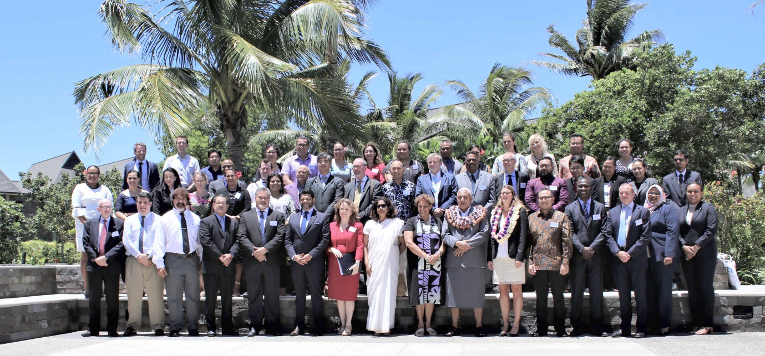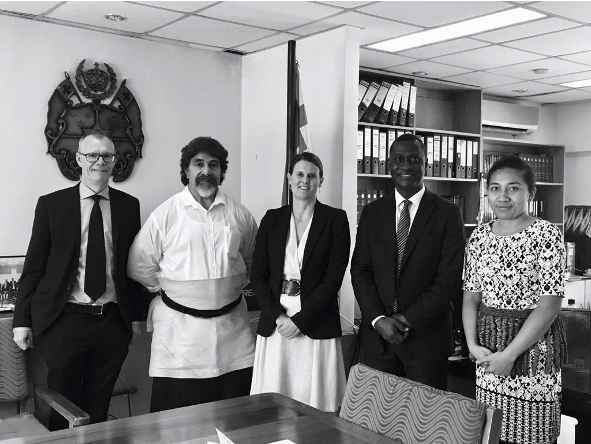Pacific
A region with strong democratic and rule of law traditions, the Pacific has strategic importance to the global goals of accelerating ratification and active implementation of the Convention against Torture (UNCAT). Pacific Small Island Developing States (PSIDS) have many good laws, policies and practices in respect of constitutional and legal frameworks, and the broader administration of justice. Some States are applying innovative approaches to implementing safeguards against torture and ill-treatment in areas such as policing and prisons, and a number of States have adopted or are in the process of adopting specific anti-torture legal frameworks. UNCAT reinforces Pacific values and strengthens the very foundations of Pacific societies.
CTI Core State Fiji’s own ratification of UNCAT in 2016 was influenced by the country’s willingness and commitment to putting an end to what the Prime Minister describes as a deeply entrenched historical culture of violence and abuse.
The Pacific’s tradition of collaboration and mutual support guides CTI’s work in the region. Providing one-on-one technical advice and sharing of experiences and lessons learned between countries through visits and seminars form part of the CTI toolkit helping Pacific governments overcome capacity related challenges to ratification, implementation and reporting.
Regional ratification across Pacific SIDS
We do not tolerate human rights abuses of any kind. They are legally and morally unacceptable. And we are determined to bring the perpetrators of such abuses to justice.
The Hon. Josaia Voreqe Bainimarama, Prime Minister of Fiji, on the country’s decision to ratify UNCAT.

Universal Ratification and Implementation in the Pacific
Six Pacific Small Island Developing States are party to UNCAT, namely Fiji, Kiribati, Marshall Islands, Nauru, Samoa and Vanuatu.
Positively, all remaining Pacific non-States-parties have expressed their commitment to ratify/accede to UNCAT, either at their Universal Periodic Review (UPR) or through the statements of high-level Government officials during CTI events.

Recent ratifications of UNCAT in the Pacific were preceded by active and positive cooperation between CTI and Governments from the region, through bilateral and multilateral engagement in capital and through permanent missions in Geneva and New York.
For example, CTI closely supported the efforts of Fiji and Samoa as they prepared to ratify UNCAT. CTI also carried out a diplomatic visit to Tonga in February 2019, and organised two regional seminars for Pacific States, the first in October 2016 and the second in February 2019, hosted by Fiji and attended by representatives from all PSIDS.
CTI is eager to continue supporting Pacific governments as they move towards ratification/accession of UNCAT and as part of their efforts to meet the commitments contained therein.

Reporting to the UN Committee against Torture
Reporting to the UN Committee against Torture (CAT) is a key obligation as well as an important indicator of progress and positive source of advice. Yet reporting is one of the main challenges faced by small island nations when implementing UNCAT and other core human rights treaties.
Despite these challenges, Pacific States are leading the way by putting in place institutional coordination bodies to help facilitate the reporting process. In July 2020, the Pacific became the first region to issue region-wide advice, called the Pacific Principles of Practice of National Mechanisms for Implementation, Reporting and Follow-Up (NMIRFs), which have already been endorsed by eight Pacific States. These principles are aimed at streamlining processes of implementing and monitoring human rights and sustainable development commitments through an integrated approach, and making a more efficient use of technical, financial and human resources.
In addition to helping PSIDS comply and benefit from the reporting process, CTI is actively engaged in highlighting the reporting constraints faced by small States in its annual briefings to the CAT, and has presented proposals and recommendations to the Committee against Torture as well as the UN’s treaty strengthening and reform exercise, so as to accommodate the challenges of small States.
Anti-torture Legislative Frameworks and Justice Reforms
CTI is prioritising technical assistance to Pacific States as they take action – prior and post ratification – to harmonise their national legislation with the requirements of UNCAT. CTI advises governments on legislative reforms and on the practical implementation of UNCAT in order to support fairness, transparency and accountability in the justice sector.
A CTI seminar held in Fiji on 6-8 February 2019 focused on building capacity amongst Pacific States with processes of legislative review and drafting of anti-torture laws or amendments. CTI continues to provide one-on-one confidential advice to identify the degree to which domestic legislation already covers the obligations contained in UNCAT as well as areas where reforms would be recommended to achieve compliance with the Convention following ratification. Nine PSIDS already prohibit torture and ill-treatment in their Constitutions, and most of the region’s national laws allow for the prosecution of acts of torture under an array of offences, constituting a good basis for subsequent reform in order to criminalise torture as a separate and explicit offence.
UNCAT and Sustainable Development
Ratifying and implementing human rights treaties are foundational steps towards reaching the Sustainable Development Goals, particularly SDG 16, which promotes peaceful and inclusive societies, access to justice for all and effective, accountable and inclusive institutions at all levels.
UNCAT contains the basis for the consolidation of a fair and effective administration of justice, and for preventing violence and abuse in all their forms. The process of implementation of UNCAT has helped several States parties improve access to justice including among the most vulnerable in society, and develop good practices in policing, prison management and law enforcement in general. Discussing UNCAT and the SDGs together lays the foundations for long-term legal and economic progress.
In acceding to UNCAT Kiribati confirms its support to the principles of equal and inalienable rights of people, which is the foundation of freedom, justice and peace.
Honourable Natan Teewe, Minister of Justice of Kiribati, upon accession to UNCAT, in July 2019.
Our Partners in the Pacific
The CTI Core Group and Group of Friends are active in the Pacific, promoting treaty ratification/accession and supporting a wide range of projects on administration of justice and law enforcement training and capacity building.
CTI collaborates closely with partner organisations working in the Pacific region. These include the Human Rights and Social Development Division (HRSD) of the South Pacific Community and the Universal Rights Group (URG). HRSD, the Pacific Community’s regional human rights capacity building centre, is supporting governments in the Pacific to become parties to UNCAT and domesticate its provisions into national law.
CTI further collaborates with OHCHR and UNDP. Many of their projects in PSIDS countries and/or at regional level are relevant for UNCAT implementation, such as trainings for law enforcement personnel and on reporting to the UN Treaty Bodies.
I would like to thank CTI as well as other development partners who have made it their mission to assist the Pacific States in appreciating the tasks that lie ahead in our endeavor to eliminate torture in all its forms, and to implement the Convention in our respective Island Nations.
Hon. Sione Vuna Fa’otusia, Minister for Justice of Tonga, during CTI regional seminar in Fiji, 6-8 February 2019

